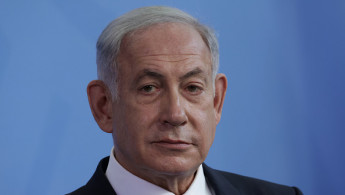Breadcrumb
Netanyahu 'preventing Gaza ceasefire', fears persist over state of hostages
Negotiations for a ceasefire in Gaza have encountered hurdles following reports that Israeli Prime Minister Benjamin Netanyahu is preventing a deal with Hamas, and that Hamas is unable to provide 40 hostages as part of said deal.
On Thursday, Israel's Channel 12 News published a recording from a member of the Israeli negotiating team in Cairo who claimed that Netanyahu's government is not doing enough to secure a deal.
"We experienced a lack of attention on the part of the Prime Minister to accept ideas and suggestions," the negotiator said.
"The Israeli government is not doing everything, nor is it doing what is expected of it. There may be a deal in the end, but it is a worse deal than what we could have achieved two months ago and we will receive fewer hostages alive. We cannot waste any more time," they added.
In response, Netanyahu's office blamed Hamas for the lack of a deal being achieved. "Hamas, who continues to present hallucinatory demands, is the one who is delaying the return of our hostages."
It is not the first time Netanyahu has been accused of stifling negotiations, with reports in November 2023 claiming Netanyahu rejected a five-day ceasefire that would have seen the release of hostages after refusing to allow Hamas five days to gather the hostages.
Far-right cabinet ministers Itamar Ben-Gvir and Bezalel Smotrich have also voiced opposition to hostage agreements and have previously threatened to leave the government for a number of reasons.
This includes Ben-Gvir's attempts to pressure Netanyahu into invading Rafah and Smotrich demanding more full security cabinet meetings.
In an interview with Democracy Now, Dr Mark Perlmutter - who had just returned from a mission in Gaza - recounted that he found "distinct signs of genocide".
— The New Arab (@The_NewArab) April 12, 2024
Describing the shocking and devastating injuries he treated while working in the European Hospital in Khan Younis, Dr… pic.twitter.com/p5pISFVKLC
Opposition leader Yair Lapid has said that he would back the government's hostage deal if Ben-Gvir and Smotrich turned against the government.
Between 24 and 30 November, a six-day ceasefire in Gaza saw the exchange of 105 hostages for the release of 240 Palestinian prisoners.
As well as reports that Netanyahu is stifling the ongoing negotiations in Cairo, reports are emerging that Hamas does not have the required 40 hostages that would make up phase one of a US-backed ceasefire.
Hamas said that the group could not commit to releasing 40 living hostages but rather could release 40 hostages in total, sparking fears that a greater number of hostages have been killed in Gaza.
Senior Hamas official Bassem Naim also said that the group needed time and a ceasefire to gather the remaining hostages.
Israel estimates that 34 hostages in Gaza are dead; however, according to the Wall Street Journal (WSJ), both US and Israeli officials privately estimate that the number of hostages killed in Gaza could be higher.
This includes some US intelligence estimates that indicate most of the hostages are already dead, although officials told the WSJ that the intelligence is limited.
This includes those who died as a result of injuries sustained during the events of 7 October, during which Hamas and other Palestinian militant groups took around 240 hostages, as well as those who have died from health complications.
According to Hamas Israeli strikes in Gaza, which have killed 33,634 Palestinians and injured a further 76,214, have also killed hostages, with Israel killing three hostages who freed themselves in December and Hamas declaring that one was killed in a failed hostage rescue attempt.
Hostages negotiations have been ongoing in Cairo since the weekend, with Egyptian, Qatari and US officials mediating between Israel and Hamas.






![Anthony Blinken speech [Getty] Anthony Blinken speech [Getty]](/sites/default/files/styles/image_684x385/public/media/images/6263436E-8ACD-4D3C-9055-25A7BE79DD5A.jpg?h=d1cb525d&itok=fLHmHCRG)
 Follow the Middle East's top stories in English at The New Arab on Google News
Follow the Middle East's top stories in English at The New Arab on Google News
![Circassian man celebrating in Damascus 2024 [Getty]](/sites/default/files/styles/image_330x185/public/2189044702.jpeg?h=a5f2f23a&itok=7YgHXQgb)

